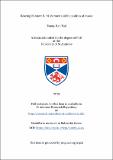Files in this item
Hearing Forster: E. M. Forster and the politics of music
Item metadata
| dc.contributor.advisor | Sutton, Emma | |
| dc.contributor.author | Tsai, Tsung-Han | |
| dc.coverage.spatial | v, 212 p. | en_US |
| dc.date.accessioned | 2014-01-28T10:42:56Z | |
| dc.date.available | 2014-01-28T10:42:56Z | |
| dc.date.issued | 2013-12-03 | |
| dc.identifier.uri | https://hdl.handle.net/10023/4424 | |
| dc.description.abstract | This thesis explores E. M. Forster’s interest in the politics of music, illustrating the importance of music to Forster’s conceptions of personal relationships and imperialism, national character and literary influence, pacifism and heroism, class and amateurism. Discussing Forster’s novels, short stories, essays, lectures, letters, diaries, and broadcast talks, the thesis looks into the political nuances in Forster’s numerous allusions and references to musical composition, performance, and consumption. In so doing, the thesis challenges previous formalistic studies of Forster’s representations of music by highlighting his attention to the contentious relations between music and political contingencies. The first chapter examines A Passage to India, considering Forster’s depictions of music in relation to the novel’s concern with friendship and imperialism. It explores the ways in which music functions politically in Forster’s most ‘rhythmical’ novel. The second chapter focuses on Forster’s description of the performance of Lucia di Lammermoor in Where Angels Fear to Tread. Reading this highly crafted scene as Forster’s attempt to ‘modernize’ fictional narrative, it discusses Forster’s negotiation of national character and literary heritage. The third chapter assesses Forster’s Wagnerism, scrutinizing the conjunction between Forster’s rumination on heroism and his criticism of Siegfried. The chapter pays particular attention to Forster’s uncharacteristic silence on Wagner during and after the Second World War. The fourth chapter investigates Forster’s celebration of musical amateurism. By analysing his characterization of musical amateurs and professionals in ‘The Machine Stops’, Arctic Summer, and Maurice, the chapter discusses the gender and class politics of Forster’s championing of freedom and idiosyncrasy. | en_US |
| dc.language.iso | en | en_US |
| dc.publisher | University of St Andrews | |
| dc.subject | E. M. Forster | en_US |
| dc.subject | Music | en_US |
| dc.subject | Politics | en_US |
| dc.subject | Modernism | en_US |
| dc.subject.lcsh | Forster, E. M. (Edward Morgan), 1879-1970--Criticism and interpretation | en_US |
| dc.subject.lcsh | Forster, E. M. (Edward Morgan), 1879-1970--Political and social views | en_US |
| dc.subject.lcsh | Music in literature | en_US |
| dc.subject.lcsh | Music--Political aspects | en_US |
| dc.title | Hearing Forster: E. M. Forster and the politics of music | en_US |
| dc.type | Thesis | en_US |
| dc.type.qualificationlevel | Doctoral | en_US |
| dc.type.qualificationname | PhD Doctor of Philosophy | en_US |
| dc.publisher.institution | The University of St Andrews | en_US |
| dc.rights.embargoreason | Embargo period has ended, thesis made available in accordance with University regulations | en_US |
| dc.identifier.doi | https://doi.org/10.17630/10023-4424 |
This item appears in the following Collection(s)
Items in the St Andrews Research Repository are protected by copyright, with all rights reserved, unless otherwise indicated.

